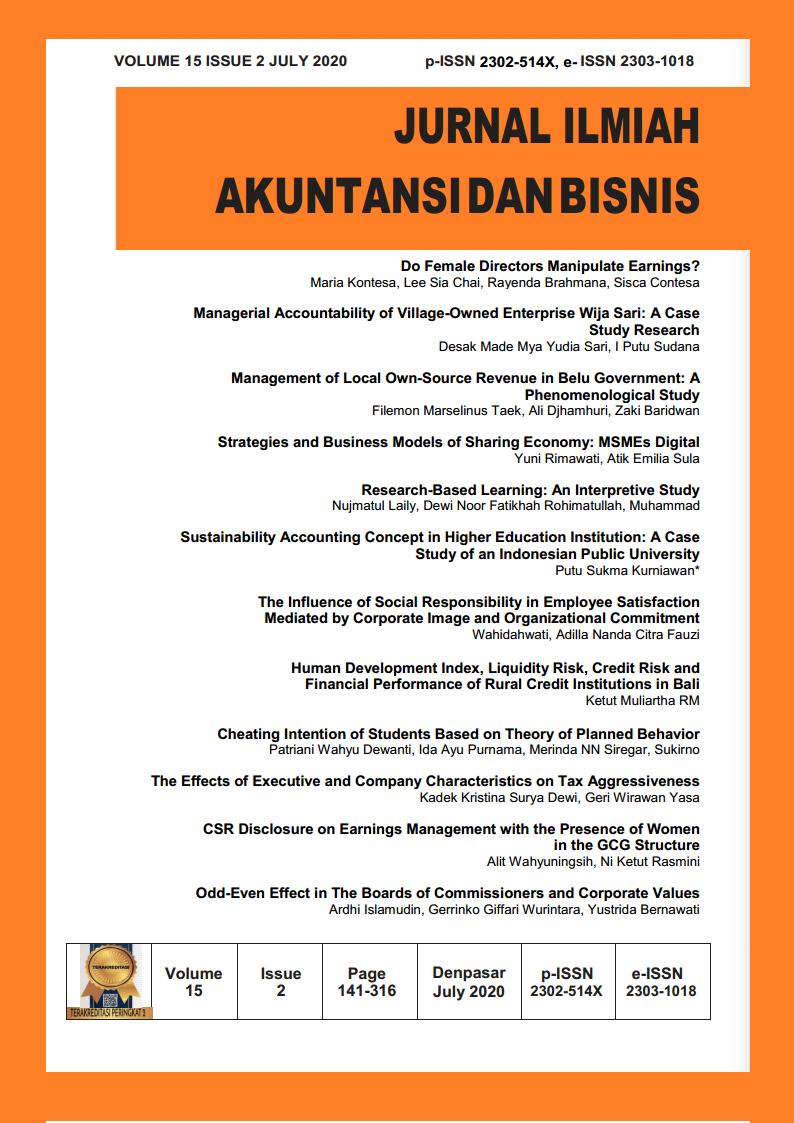Do Female Directors Manipulate Earnings?
Abstract
This study aims to examine the effect of female directors in firm’s earnings management for a sample of 263 Malaysian listed firms over 2013-2017 period. After running a robust panel regression, the result of this study shows that firm that have higher participation rate of women in the boardroom will have a higher tendency of manipulating earnings. The reason why there is a significant relationship between female directors and earnings management might be caused by the corporate culture pressure on women. The findings provide insight for industry and policymakers on the impact of gender diversity on earnings management. It may serve as a guideline in their selection of the organization's top management and decision-making process.
Keywords: Female directors, earnings quality, women on board, earnings management.
Downloads
References
Adams, R. B., & Ferreira, D. (2009). Women in the boardroom and their impact on governance and performance. Journal of financial economics, 94(2), 291-309.https://doi.org/10.1016/j.jfineco.2008.10.007
Arun, T. G., Almahrog, Y. E., &Aribi, Z. A. (2015). Female directors and earnings management: Evidence from UK companies. International Review of Financial Analysis, 39, 137-146.https://doi.org/10.1016/j.irfa.2015.03.002
Bartov, E., Gul, F. A., &Tsui, J. S. (2000). Discretionary-accruals models and audit qualifications. Journal of accounting and economics, 30(3), 421-452.https://doi.org/10.1016/S0165-4101(01)00015-5.
Beneish, M. D. (1999). Incentives and penalties related to earnings overstatements that violate GAAP. The Accounting Review, 74(4), 425-457.https://doi.org/10.2308/accr.1999.74.4.425.
Betz, M., O'Connell, L., & Shepard, J. M. (1989). Gender differences in proclivity for unethical behavior. Journal of Business Ethics, 8(5), 321-324.https://doi.org/10.1007/BF00381722.
Brahmana, R., & Chen, S. N. (2016). The Role of Women Directors for Malaysian Firms' Performance. In Revealing Gender Inequalities and Perceptions in South Asian Countries through Discourse Analysis (pp. 121-136). IGI Global.https://doi.org/10.4018/978-1-5225-3909-4.ch077.
Carter, D. A., D'Souza, F., Simkins, B. J., & Simpson, W. G. (2010). The gender and ethnic diversity of US boards and board committees and firm financial performance. Corporate Governance: An International Review, 18(5), 396-414.https://doi.org/10.1111/j.1467-8683.2010.00809.x
Casey, C., Skibnes, R., & Pringle, J. K. (2011). Gender equality and corporate governance: Policy strategies in Norway and New Zealand. Gender, Work & Organization, 18(6), 613-630.https://doi.org/10.1111/j.1468-0432.2010.00514.x
Chong, G. (2006). Is income smoothing ethical?.Journal of Corporate Accounting & Finance, 18(1), 41-44.https://doi.org/10.1002/jcaf.20261
Donaldson, L. (2014). The contingency theory of organizational design: challenges and opportunities. In Organization design (pp. 19-40). Springer, Boston, MA.https://doi.org/10.4135/9781452229249
Erhardt, N. L., Werbel, J. D., &Shrader, C. B. (2003). Board of director diversity and firm financial performance. Corporate governance: An international review, 11(2), 102-111.https://doi.org/10.1111/1467-8683.00011
Farrell, K. A., &Hersch, P. L. (2005). Additions to corporate boards: The effect of gender. Journal of Corporate finance, 11(1-2), 85-106.https://doi.org/10.1016/j.jcorpfin.2003.12.001
Francis, J. R., Maydew, E. L., & Sparks, H. C. (1999). The role of Big 6 auditors in the credible reporting of accruals. Auditing: A Journal of Practice & Theory, 18(2), 17-34.https://doi.org/10.2308/aud.1999.18.2.17
Gavious, I., Segev, E., & Yosef, R. (2012). Female directors and earnings management in high-technology firms. Pacific Accounting Review, 24(1), 4-32.https://doi.org/10.1108/01140581211221533
Ghofar, A., & Islam, S. (2015). Corporate governance and contingency theory. Suiza: Springer International Publishing.
Gray, S. J., Kang, T., Lin, Z., & Tang, Q. (2015). Earnings management in Europe post IFRS: Do cultural influences persist?. Management International Review, 55(6), 827-856.https://doi.org/10.1007/s11575-015-0254-7
Gupta, V. K., Mortal, S., Chakrabarty, B., Guo, X., & Turban, D. B. (2019). CFO Gender and Financial Statement Irregularities. Academy of Management Journal, 63(3), in-press.https://doi.org/10.5465/amj.2017.0713
Healy, P. M., &Wahlen, J. M. (1999). A review of the earnings management literature and its implications for standard setting. Accounting horizons, 13(4), 365-383.https://doi.org/10.2308/acch.1999.13.4.365
Kaplan, S., Pany, K., Samuels, J., & Zhang, J. (2009). An examination of the association between gender and reporting intentions for fraudulent financial reporting. Journal of Business Ethics, 87(1), 15-30.https://doi.org/10.1007/s10551-008-9866-1
Kim, H. A., Jeong, S. W., Kang, T., & Lee, D. (2017). Does the presence of female executives curb earnings management? Evidence from Korea. Australian Accounting Review, 27(4), 494-506.https://doi.org/10.1111/auar.12169
Kirsch, A. (2018). The gender composition of corporate boards: A review and research agenda. The Leadership Quarterly, 29(2), 346-364.https://doi.org/10.1016/j.leaqua.2017.06.001
Krishnan, G. V., & Parsons, L. M. (2008). Getting to the bottom line: An exploration of gender and earnings quality. Journal of Business Ethics, 78(1-2), 65-76.https://doi.org/10.1007/s10551-006-9314-z
Lee, B. B., & Choi, B. (2002). Company size, auditor type, and earnings management. Journal of Forensic Accounting, 3, 27-50.
Liu, Y., Wei, Z., &Xie, F. (2016). CFO gender and earnings management: evidence from China. Review of Quantitative Finance and Accounting, 46(4), 881-905. https://doi.org/10.1007/s11156-014-0490-0
Lückerath-Rovers, M. (2013). Women on boards and firm performance. Journal of Management & Governance, 17(2), 491-509.https://doi.org/10.1007/s10997-011-9186-1
Matsa, D. A., & Miller, A. R. (2011). Chipping away at the Glass Ceiling: Gender Spillovers in Corporate Leadership. The American Economic Review, 635-639.https://doi.org/10.1257/aer.101.3.635
Miethe, T. D., & Rothschild, J. (1994). Whistleblowing and the Control of Organizational Misconduct*. Sociological Inquiry, 64(3), 322-347.https://doi.org/10.1111/j.1475-682X.1994.tb00395.x
Mínguez-Vera, A., &López-Martínez, R. (2010). Female directors and SMES: An empirical analysis. Journal of Global Strategic Management, 8(2), 34-46.
Niederle, M., &Vesterlund, L. (2011). Gender and competition. Annual. Review of Economics, 3(1), 601-630.https://doi.org/10.1146/annurev-economics-111809-125122
O’Fallon, M. J., & Butterfield, K. D. (2005). A review of the empirical ethical decision-making literature: 1996–2003. Journal of business ethics, 59(4), 375-413.https://doi.org/10.1007/s10551-005-2929-7
Saundra, H. G., Minnette, A. B., Glynda, F. S., & George, A. M. (2002). Gender differences in ethical decision making. Women in Management Review, 17(5), 217-227.https://doi.org/10.1108/09649420210433175
Singh, V., &Vinnicombe, S. (2004). Why so few women directors in top UK boardrooms? Evidence and theoretical explanations. Corporate Governance: An International Review, 12(4), 479-488.International Review. https://doi.org/10.1111/j.1467-8683.2004.00388.x
Srinidhi, B., Gul, F. A., &Tsui, J. (2011). Female Directors and Earnings Quality. Contemporary Accounting Research, 28(5), 1610-1644.https://doi.org/10.1111/j.1911-3846.2011.01071.x
Wang, Y., & Clift, B. (2009). Is there a “business case” for board diversity?.Pacific Accounting Review, 21(2), 88-103.https://doi.org/10.1108/01140580911002044
Ye, K., Zhang, R., &Rezaee, Z. (2010). Does top executive gender diversity affect earnings quality? A large sample analysis of Chinese listed firms. Advances in Accounting, 26(1), 47-54.https://doi.org/10.1016/j.adiac.2010.02.008
Zalata, A. M., Ntim, C. G., Choudhry, T., Hassanein, A., &Elzahar, H. (2019). Female directors and managerial opportunism: Monitoring versus advisory female directors. The Leadership Quarterly, 30(5), 101309.https://doi.org/10.1016/j.leaqua.2019.101309




















